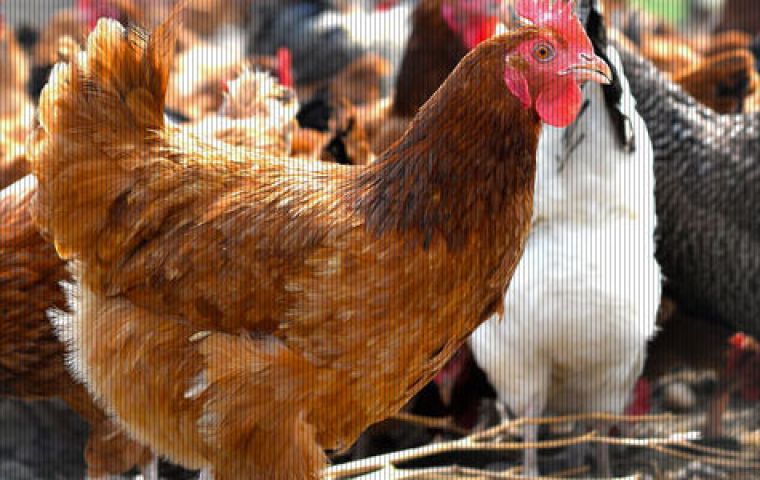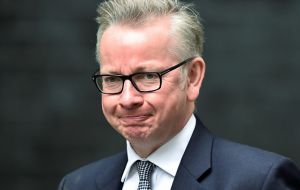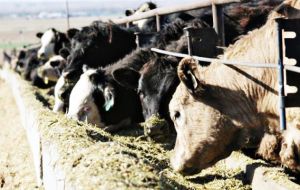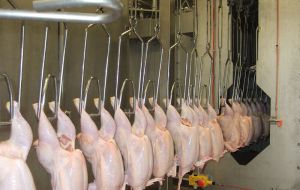MercoPress. South Atlantic News Agency
UK farmers growing concern about a post Brexit scenario
 Concerns have been raised that a deal with the US could include chlorine-washed chicken and hormone-fed beef.
Concerns have been raised that a deal with the US could include chlorine-washed chicken and hormone-fed beef.  Environment Secretary Michael Gove, who has promised that standards would not be compromised post-Brexit, is due to address two farmers' conferences in Oxford.
Environment Secretary Michael Gove, who has promised that standards would not be compromised post-Brexit, is due to address two farmers' conferences in Oxford.  The use of certain growth hormones in cattle-rearing is legal in the US but in 1988 the EU banned the use of several major growth promotion hormones
The use of certain growth hormones in cattle-rearing is legal in the US but in 1988 the EU banned the use of several major growth promotion hormones  In the US, it is legal to wash chicken carcasses in chlorinated water to kill germs - but this has been banned in the EU since 1997 on welfare grounds.
In the US, it is legal to wash chicken carcasses in chlorinated water to kill germs - but this has been banned in the EU since 1997 on welfare grounds. Post-Brexit trade deals could pose the biggest peacetime threat to the UK's food security if welfare standards and farmers are not protected, MPs say. Imports of food produced with lower welfare standards should not be allowed, the All-Party Parliamentary Group on Agro-ecology warns.
Concerns have been raised that a deal with the US could include chlorine-washed chicken and hormone-fed beef. Defra said it was “committed to securing the best possible trade deal”.
Environment Secretary Michael Gove, who has promised that standards would not be compromised post-Brexit, is due to address two farmers' conferences in Oxford.
The use of certain growth hormones in cattle-rearing is legal in the US but in 1988 the EU banned the use of several major growth promotion hormones, which it said posed a potential risk to human health.
In the US, it is legal to wash chicken carcasses in chlorinated water to kill germs - but this has been banned in the EU since 1997 on welfare grounds. In relation to chlorine-washed chicken, Mr. Gove has said the UK should not allow these imports in a post-Brexit trade deal with the US, but Trade Secretary Liam Fox has said the practice was “perfectly safe”.
The MPs' report said: “If the UK is unable to protect its farmers from being undermined by lower welfare imports, farmers are likely to resist improvements and may even press for UK standards to be lowered.
”There is a real danger that enhanced compatibility of regulations would make it very difficult for the UK to improve its standards in areas such as animal welfare, food safety and pesticide use and residues.“
It warned that the import of ”cheaper foods that are produced to lower safety and welfare standards“ would place UK farmers at a disadvantage. ”To compete with these lower prices, domestic farmers could seek to tighten their margins and therefore cut corners with regards to environmental regulations,“ it said.
The group's chairwoman, Labour MP Kerry McCarthy, said: ”There are serious concerns that if negotiators don't value farmers enough and build poorly managed trade deals that reflect this - particularly a US-UK deal - it could trigger a race to the bottom in terms of standards and ability of our own farmers to compete.
”The APPG (All-Party Parliamentary Group) is determined this sector should not become a bargaining chip or something that can easily be traded.“
A Defra spokesman said: ”We are committed to securing the best possible trade deal when we leave the EU - one which includes a comprehensive free trade deal with the European Union and, in due course, the chance to negotiate new free trade agreements with other countries.”




Top Comments
Disclaimer & comment rules-

-

-

Read all commentsMost EU standards for food, and most other things, have little to do with health, safety, the environment, or whatever else they claim to be protecting. They are primarily an underhanded method of excluding non-EU products from competing with EU producers, especially their heavily subsidized, and still non-competitive, agriculture industry.
Jan 04th, 2018 - 05:12 pm +1Eliminating EU standards and regulations is one of the major advantages to be gained from leaving the EU. It would substantially lower the cost of living for average citizens by making available lower cost non-EU products -- without the EU's standards, regulations and protective tariffs that no make them expensive, or unavailable. But, there must be a government willing to accept these advantages, and pass them on to the public -- the present one won't.
Ha... so UK farmers are already advocating protectionism before we even have any trade deals...
Jan 04th, 2018 - 07:24 pm 0If you can't compete do something else instead of living off subsidies...like when you are paid not to grow stuff...
The US spends billions of dollars subsidising its agriculture, of course our farmers can't compete.
Jan 04th, 2018 - 10:48 pm 0Besides, it would be completely pointless to enforce standards here in Britain and then allow imports from countries that don't follow them, as well as putting our own farmers at a big disadvantage. We should decide what standards we want and then only allow imports that follow those rules.
Commenting for this story is now closed.
If you have a Facebook account, become a fan and comment on our Facebook Page!